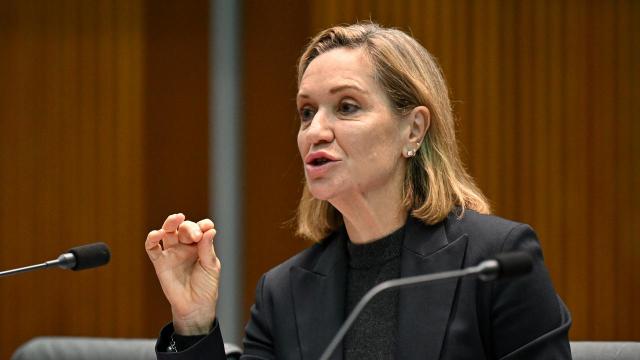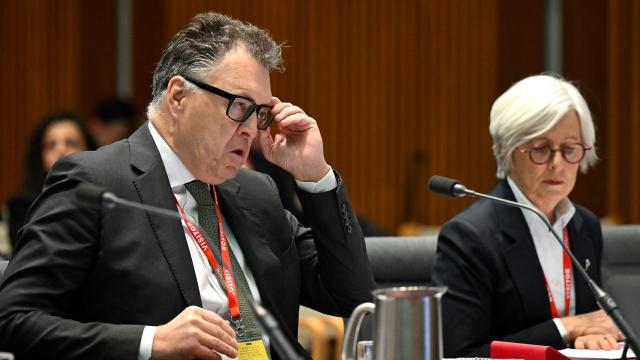‘Potentialconflict’: PwC kept in the dark for a year on CEO pay
Luke Sayers accused of showing ‘contempt’ in fiery hearing into PwC scandal
Former PwC bosses undergo grilling, hit back at Beattie’s evidence
Officials left in dark over PwC boss $1.2m salary boost
PwC chief’s $1.2m bonus kept ‘secret for more than a year’, inquiry told
‘Potential conflict’: PwC kept in the dark for a year on CEO pay
Maxim
Shanahan and Edmund Tadros
Aug 2, 2024
PwC Australia chief executive Kevin Burrowes did not inform key executives
for almost a year that the firm’s global arm was paying nearly a third of his
$4 million salary, a parliamentary committee has heard.
Mr Burrowes’ exact relationship with PwC International – which has placed
the local firm under supervision in the wake of its tax leaks scandal –
remains unclear, with the board unaware of both the terms of his engagement and
to whom he reports.
Kevin Burrowes. left, did not inform PwC’s chief risk officer Jan McCahey,
right, about his second role for almost a year. Irene Dowdy
The role of PwC International, which has refused multiple requests to
release an internal report into the involvement of overseas partners in
scandal, is the focus of ongoing scrutiny of PwC’s efforts to reform its
governance and culture in response.
Under questioning on Friday at a joint parliamentary committee probing
misconduct in the accounting and consulting industry, Mr Burrowes repeatedly
denied his role with the international firm presented a conflict of interest.
Mr Burrowes, who was sent from Singapore to take over PwC’s Australian operations
in June last year after the scandal broke in The
Australian Financial Review, instead argued his joint role was
“aligned” with his objective of cleaning up the troubled Australian branch.
Earlier on Friday, PwC chief risk officer Jan McCahey told the committee she
was kept in the dark about the arrangement with Mr Burrowes, and his dual
employment could present a “potential conflict of interest”.
Linklaters report
Mr Burrowes also defended his inability to provide a copy of a report into
the involvement of overseas partners in the tax leaks scandal.
The report was paid for by PwC International and apparently cleared overseas
partners of using confidential information related to the tax leaks “for
commercial gain”.
PwC International, which has only released a brief summary of the report,
disciplined six of the firm’s international operatives for not inquiring about
the nature of what turned out to be confidential data.
The international arm has consistently denied requests to provide the report
to the Senate, citing legal privilege. Mr Burrowes told the committee he had
not seen the report.
He told the committee the report was not relevant to his role in Australia,
even though the failure to meet repeated demands from parliamentary committees
for transparency meant ongoing scrutiny of the firm.
“I don’t believe it’s pertinent to what we’re trying to do in Australia,” Mr
Burrowes said, denying Labor Senator Deborah O’Neill’s proposition that he had
been put “in a completely intolerable position” by not having access to the
report while trying to reform the Australian firm.
Payment secrecy
Mr Burrowes was repeatedly questioned about his failure to disclose the
additional payments when asked about his salary by a Senate committee earlier
this year.
Senator O’Neill characterised Mr Burrowes’ prior answers on the topic as
“not satisfactory” and “misleading”.
It emerged that Mr Burrowes had not told Ms McCahey, his chief risk officer,
about the arrangement until June this year, almost a year after his appointment,
and partners were not informed of the situation until shortly before the
arrangement was due to become public.
Members of the Australian governance board were the only people aware of the
arrangement, until the firm was forced to prepare responses to questions on
notice from the Senate.
Mr Burrowes is due to appear before the joint committee again this
afternoon, after appearances by former chief executives Luke Sayers and TomSeymour.
PwC hasn’t paid full price for height years of risk failure
Switkowski “shredded” notes after meeting ex-PwC boss
‘Profound conflict of interest’: PwC boss accused of hiding extra income in senate hearing
PwC chief’s $1.2m bonus kept ‘secret for more than a year’, inquiry told
Embattled consultancy PwC falsely used legal privileges to withhold documents from tax office investigations, an inquiry has been told.
PwC executives appeared before a parliamentary inquiry on Friday into ethics in the sector, prompted after revelations PwC's partners had passed on confidential Treasury tax information to boost private sector business for the firm.
Speaking publicly for the first time since the tax advice scandal broke, PwC's former general counsel Meredith Beattie said the Australian Taxation Office had raised concerns in 2017 about the sharing of confidential material.
But Ms Beattie said PwC had used claims of legal privilege to deny the tax office access to critical documents it had requested as part of investigations.
"Certain parts of the tax group had not been following the protocols, they had not been following the legal engagement letters, and the effect of that mean that the privilege claims that had been made ... were not valid," she told the inquiry.
"I raised the issues with a group within the firm ... and as a result of the letter we had received from the ATO ... they were raising very allegations about the firm that was using privilege in a way that was designed to hide matters from the tax office."
Former Telstra boss Ziggy Switkowski, who was appointed to lead an independent review into PwC's Australian operations, said he was not able to speak with previous chief executive Tom Seymour as part of the probe.
Mr Seymour, who will appear before the inquiry on Friday, was the head of PwC's operations in Australia when the tax advice scandal was playing out.
Mr Switkowski told the inquiry the governance of PwC was poor during the controversy.
"You could see what they were doing and how it was, at least superficially, like every other firm. But in practice it was not really match fit for what they had to confront during that period," he said.
Earlier, the inquiry was told PwC's chief risk officer Jan McCahey did not know for nearly a year the Australian chief executive Kevin Burrowes received $1.2 million extra from PwC's global headquarters on top of his $2.8 million salary.
Mr Burrowes was named as chief executive in July 2023 following the Treasury scandal, but it wasn't until June 2024 that Ms McCahey was told about the top up in pay.
"I wasn't aware of it ... I was surprised to learn of it at the time," Ms McCahey told the inquiry.
"(When I found out) I can't remember what I said. I was surprised."
Mr Burrowes said while the salary top up was disclosed to the firm's board, its risk officer was not told.
But Labor senator and inquiry chair Deborah O'Neill said, with the payment, Mr Burrowes could be seen as "serving two masters".







